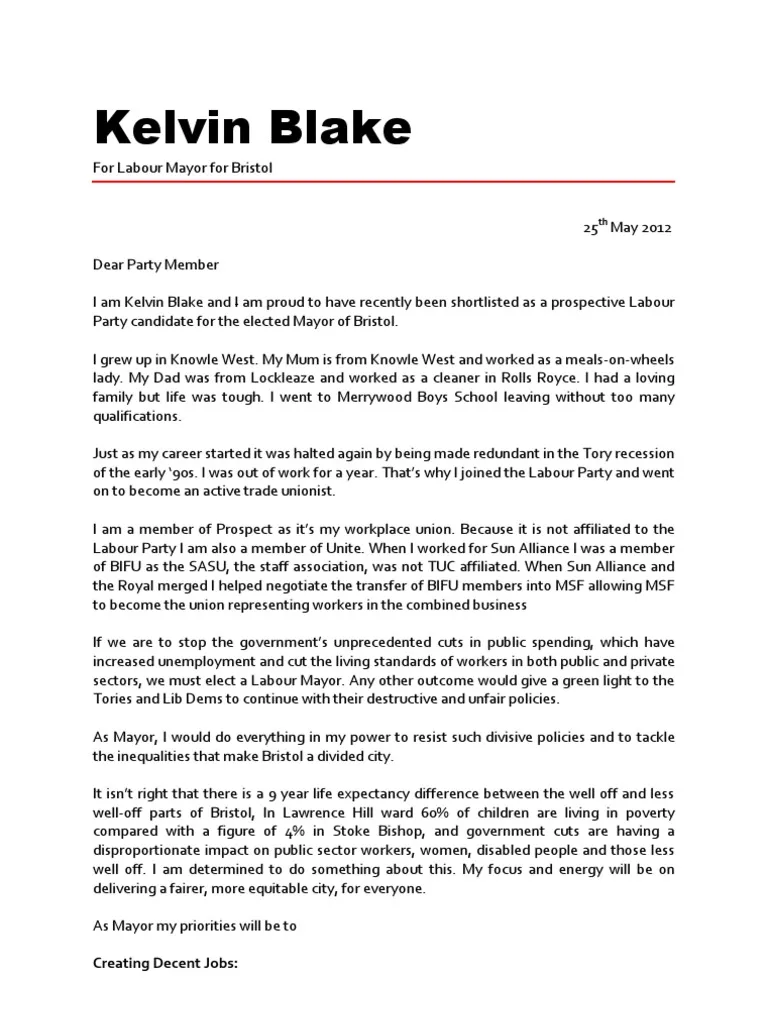Why a Strong Union Organizer Cover Letter Matters
In the competitive world of union organizing, a well-crafted cover letter is your first opportunity to make a lasting impression. It’s more than just a formality; it’s a crucial tool for demonstrating your understanding of the role, showcasing your relevant skills, and conveying your passion for the labor movement. A compelling cover letter sets the stage for your resume and can significantly increase your chances of landing an interview and ultimately, securing the job. It’s your chance to articulate your unique value proposition and explain why you are the ideal candidate to help build and strengthen the union.
Understanding the Role of a Union Organizer
Before you even begin to write your cover letter, it is essential to have a firm grasp of what a union organizer does. Union organizers are the driving force behind labor movements, responsible for recruiting new members, educating workers about their rights, negotiating contracts, and mobilizing members to take action. They work tirelessly to improve wages, benefits, and working conditions for employees. They often serve as a liaison between the union and its members, fostering a sense of solidarity and collective action. Your cover letter needs to reflect this understanding and demonstrate your commitment to these core values.
Key Skills and Qualities for a Union Organizer
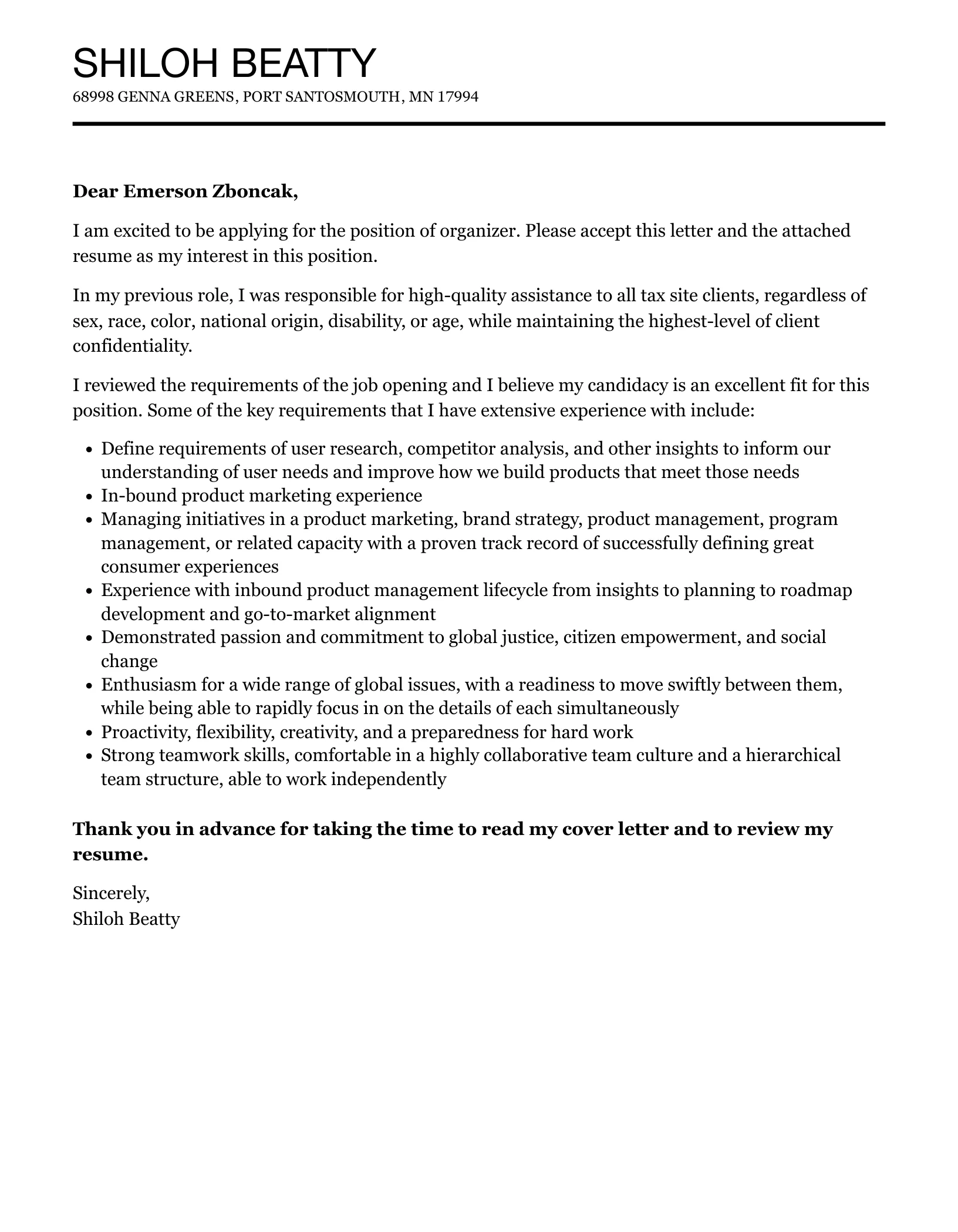
The most effective union organizers possess a unique blend of skills and qualities. Strong communication and interpersonal abilities are paramount, allowing them to connect with workers from diverse backgrounds and effectively convey complex information. Active listening, empathy, and the ability to build rapport are also crucial. Leadership qualities are essential for motivating and guiding members, while critical thinking and problem-solving skills enable organizers to navigate challenging situations. Perseverance, resilience, and a deep commitment to social justice are also hallmarks of successful organizers. Make sure your cover letter showcases how your skillset aligns with these attributes.
- Communication
- Interpersonal skills
- Leadership
- Critical thinking
- Problem-solving
Structuring Your Union Organizer Cover Letter
A well-structured cover letter is easy to read and allows the hiring manager to quickly grasp your qualifications. The standard format is typically best, but you can adjust to reflect your strengths and experience. Remember to keep it concise and focused, highlighting the most relevant information. Your cover letter should create a narrative that demonstrates your suitability for the role. Every section should serve a specific purpose, driving home your value and leaving a lasting impression. Below are guidelines for formatting.
Header and Contact Information
Begin your cover letter with a professional header that includes your full name, contact information (phone number and email address), and the date. If you know the name of the hiring manager, include their name and title as well. This information should be placed at the top left or right of the document, making it easy for the reader to find. Double-check all of the contact information is correct to ensure a smooth hiring process.
The Opening Paragraph: Grabbing Attention
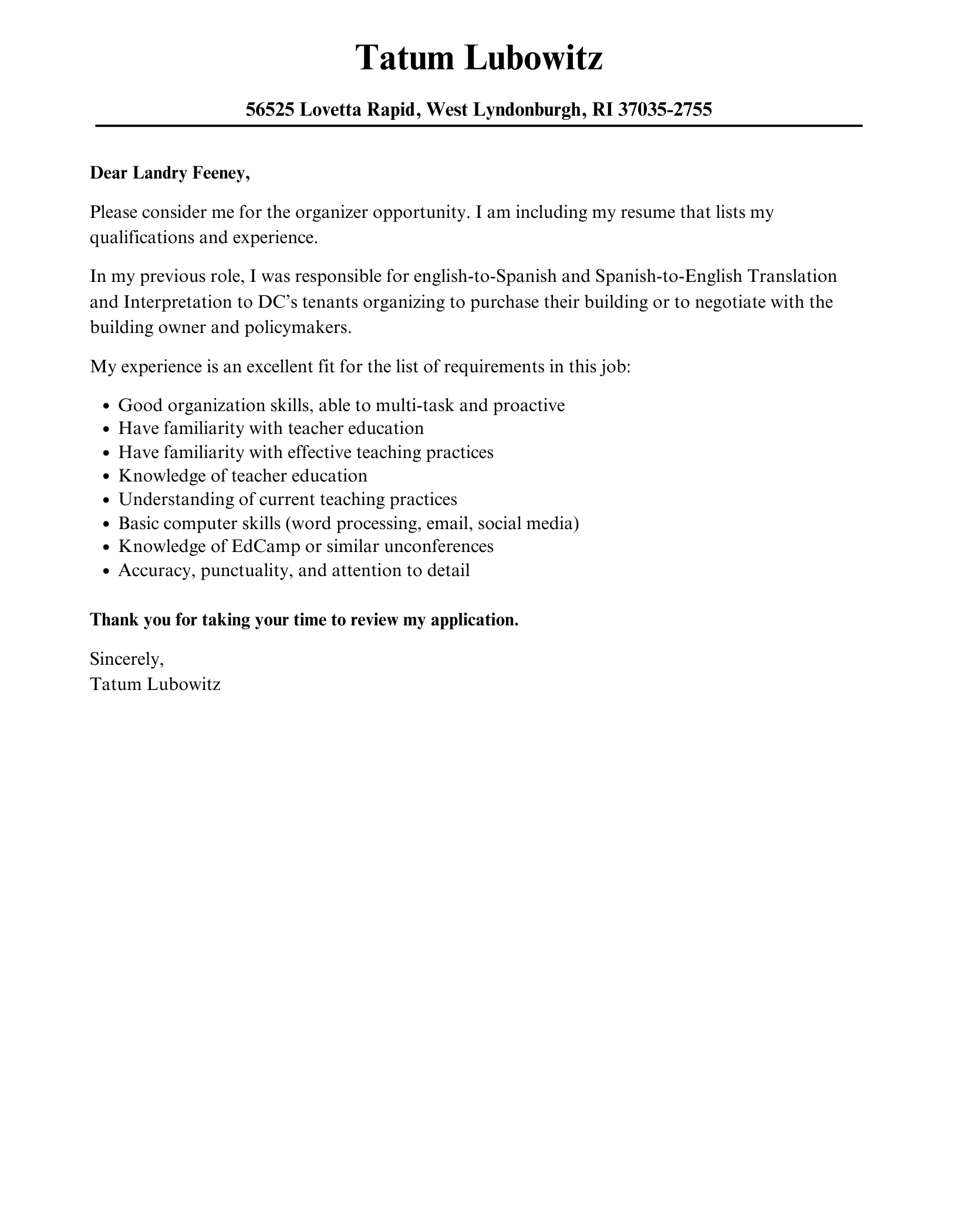
Your opening paragraph is your first chance to grab the reader’s attention. Start with a strong hook that immediately showcases your interest in the position and your understanding of the union’s mission. Briefly mention the specific role you are applying for and where you saw the job posting. Consider starting with a powerful statement about your passion for the labor movement or a brief anecdote that illustrates your relevant experience. The key is to make it clear why you are the ideal candidate and to create a desire for the reader to learn more.
Highlighting Your Relevant Experience
This section is the meat of your cover letter. Provide detailed information about your relevant experience, emphasizing your skills and accomplishments. Focus on the experiences that directly relate to the requirements of a union organizer, such as experience with community organizing, advocacy, negotiations, or leadership roles. Use action verbs to describe your responsibilities and accomplishments. Avoid simply listing your duties; instead, showcase your results and the impact you made in each role. Be sure to be specific about your past experiences and how they relate to the new position.
Quantifying Your Achievements
Whenever possible, quantify your achievements. Use numbers to demonstrate the impact of your work. For example, instead of saying “Increased membership,” say “Increased membership by 15% in six months.” Quantifiable results add credibility to your claims and demonstrate your ability to achieve tangible outcomes. This section is critical for selling your skills and experiences to the hiring manager. Include data points and statistics to show the hiring manager what you are capable of doing.
Demonstrating Your Understanding of Union Values
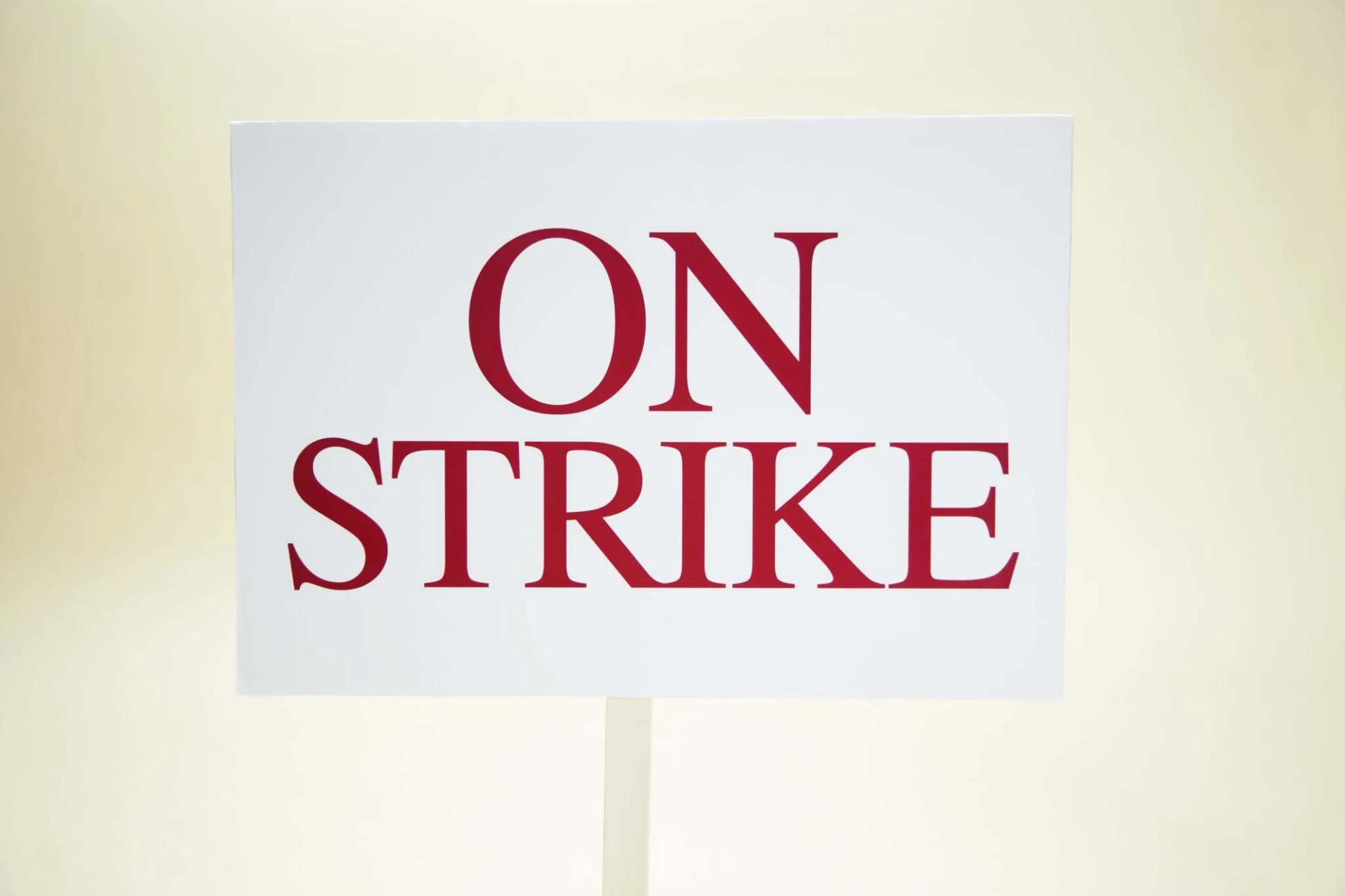
Union organizers must be deeply committed to the values of solidarity, equality, and social justice. Your cover letter is an opportunity to demonstrate your understanding of these values and how they align with your own. Discuss your involvement in any relevant organizations or causes. Explain your understanding of labor history and the importance of collective bargaining. Showcase your commitment to the rights of working people and your passion for making a positive impact in their lives. This section should speak to your core values and beliefs.
Showcasing Your Communication and Interpersonal Skills
Union organizing requires excellent communication and interpersonal skills. Demonstrate these skills throughout your cover letter. Use clear, concise language and avoid jargon. Showcase your ability to build rapport by highlighting your experience working with diverse groups of people. Demonstrate your active listening skills and your ability to empathize with others. Provide examples of how you have successfully communicated complex information or mediated disputes. Ensure your writing reflects your communication skills.
The Closing Paragraph and Call to Action
End your cover letter with a strong closing paragraph that reiterates your interest in the position and summarizes your key qualifications. Reiterate your enthusiasm and briefly mention how your skills and experience align with the union’s needs. Include a call to action, such as requesting an interview or expressing your availability for a phone call. Thank the hiring manager for their time and consideration and express your eagerness to learn more. This is your last chance to make a strong impression.
Tailoring Your Cover Letter
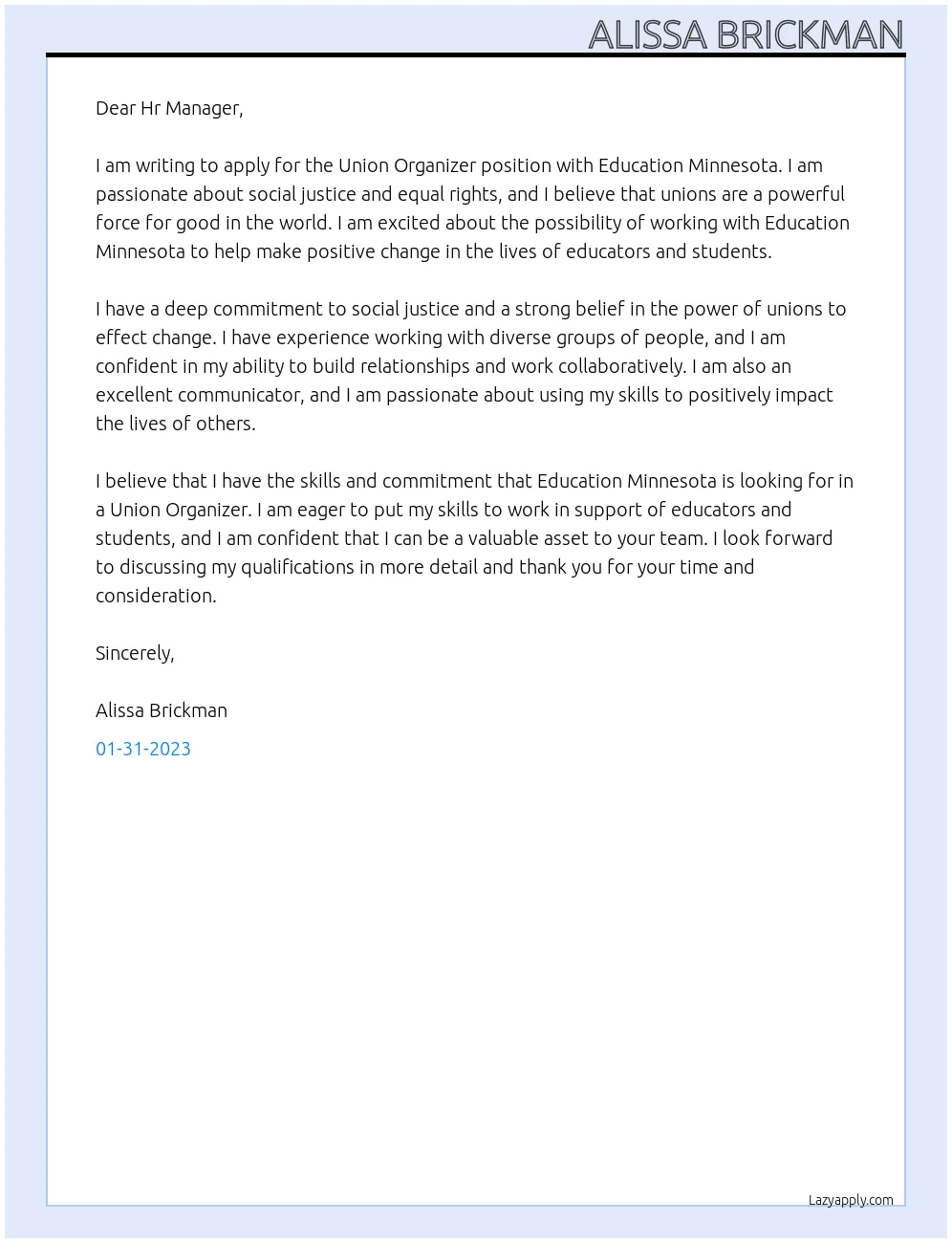
Customizing your cover letter for each position is crucial. Generic cover letters are easily spotted and often disregarded. Tailoring your letter demonstrates that you have taken the time to understand the specific requirements of the role and the values of the union. It also shows that you are genuinely interested in the opportunity, and this can go a long way with the hiring manager.
Researching the Union and the Position
Before you start writing, research the union you are applying to. Visit their website, read about their mission, values, and recent campaigns. Understand the specific responsibilities outlined in the job description. Identify the key skills and qualifications they are seeking and tailor your letter to address those needs. This research will help you demonstrate your understanding of the union and its priorities, showing that you are a good fit for the organization. This is a critical step for a successful application.
Customizing Your Letter for Each Application
Once you have researched the union and the position, customize your cover letter to match. Highlight the experiences and skills that align most closely with their needs. Use keywords from the job description in your letter. Address the specific challenges or goals of the union and explain how you can help them achieve those goals. Personalize your letter to make it clear that you are truly interested in working with this particular union. Generic cover letters are unlikely to impress a hiring manager.
Proofreading and Editing Your Cover Letter

Proofreading and editing are essential steps in writing a winning cover letter. Errors in grammar, spelling, or punctuation can undermine your credibility and damage your chances of getting an interview. Take the time to thoroughly review your cover letter, paying close attention to detail. Consider using a grammar checker or asking a friend or colleague to review your letter for you. A polished, error-free cover letter demonstrates professionalism and attention to detail.
Common Mistakes to Avoid
Avoid these common mistakes to increase your chances of success: Do not submit a generic cover letter. Do not make spelling or grammatical errors. Avoid using jargon or overly complicated language. Do not be overly boastful or arrogant. Do not include irrelevant information. Avoid using clichés or generic phrases. Be sure your cover letter is personalized. Doing this will help you stand out from the competition.
Getting Feedback on Your Cover Letter
Seek feedback from trusted sources before submitting your cover letter. Ask friends, mentors, or career advisors to review your letter and provide constructive criticism. They can help you identify areas for improvement and ensure that your letter effectively conveys your qualifications. Be open to their suggestions and make the necessary revisions. A fresh perspective can make a significant difference in the overall impact of your cover letter. This is an important step in the process.
